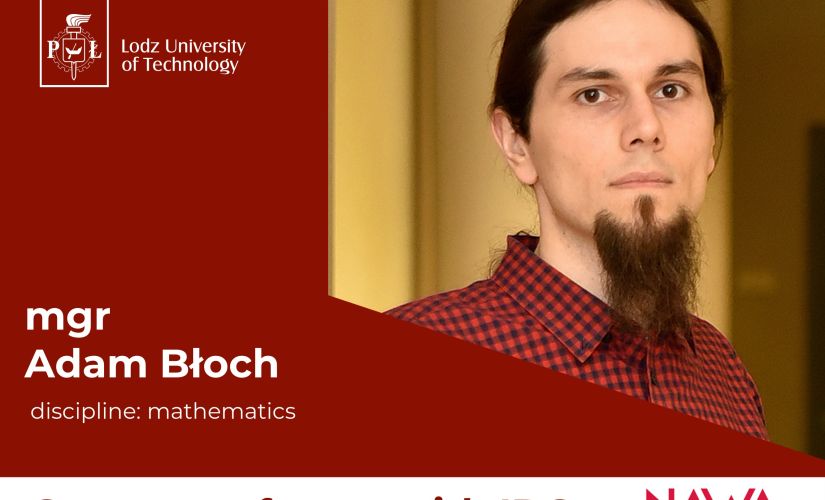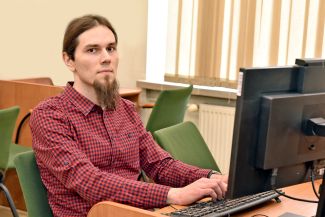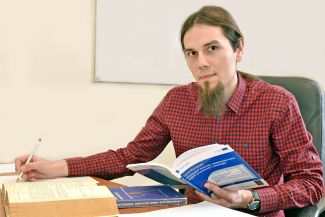What makes you passionate about the queen of sciences and how could you disenchant her "difficult" reputation?
Without much ado, I can name at least four features of mathematics that made me want to pursue this discipline. The first is quite obvious: the fact that no other scientific discipline can do without mathematics, and that it is present in probably every aspect of our lives. We are instilled with this from the first year of primary school, but it was only in university that I found out how much truth there is in this statement. Another is its universality and immutability. While many discoveries in other fields become obsolete rather quickly, Pythagoras' theorem, which is at least 2,500 years old, has not only survived to our time without any changes, but is still and will always be true again. Another aspect is the intrinsic diversity: mathematics is made up of many different branches, often very distant from each other. Some of them are more practical, while others are strongly theoretical, so I am convinced that anyone who wishes to pursue mathematics will find something in it that interests them. Last but not least, mathematics has something of the art and philosophy in it; but that is a topic for another, longer, conversation. I'm afraid I don't have a recipe for disenchanting the "difficult" reputation of the queen of sciences. I think this is mainly due to the fact that mathematics, despite its applications, is in fact a rather abstract science. It undoubtedly requires a great deal of commitment and perseverance to develop a solid foundation, which makes further work easier. It is important not to get discouraged too quickly if we do not initially see tangible results from our work.
The subject matter of your doctorate sounds complicated to the uninitiated, yet hyperbolic systems of differential equations on graphs are helpful in describing many phenomena familiar to everyone. Where do such calculations find application?
Answering this question requires some introduction. Although many branches of mathematics arose from the needs of other sciences, mainly physics, there are also quite a few branches of mathematics that are purely theoretical. These may have evolved from practical issues, or arisen entirely independent of them, for example on more philosophical grounds, or simply out of pure human curiosity. The topics of my research derive from physical issues, as hyperbolic differential equations describe many natural phenomena, such as voltage and current changes in power lines or ripples in shallow water. In addition, considering them on graphs makes it possible to model entire power grids, for example, rather than just individual lines. However, this is more theoretical research and I treat it more as a development of mathematics (or mathematical physics) itself. However, I do not exclude the possibility that my results will one day contribute at least in a small way to the solution of some practical problem.
Please list the main objectives of your work.
The most interesting aspect of differential equations on graphs is the behaviour of such a system at the "intersections", i.e. at the vertices of the graph. I will use the example of a power line again: at a point where several wires are connected together, the total current flowing into such a node must somehow be distributed among the currents flowing out of that node. If one has an association with Kirchhoff's law at this point, this is correct, but Kirchhoff's law alone is usually not enough. Our task is to define the rules of the nodes in such a way that the question is well posed, i.e. that nothing is left to chance. This was my first objective: to find these rules, mathematically called boundary conditions, and to prove that then such an issue is well posed. Another goal was to study the long-time dynamics of the solutions, i.e. how the system behaves as time passes. As I am in my final year, at this point all of these objectives should have already been met, and indeed they have
Does a mathematician's workshop mainly involve studying library resources?
From an outsider's point of view, my research work may not seem very exciting. While sifting through the existing literature is probably a common point in all fields of science, the essential part of research takes place in the head and the results of thoughts are poured onto paper. There is a photograph entitled 'Mathematician at work', showing the Polish-American mathematician Samuel Eilenberg lying on a couch and staring blankly at the ceiling. Although somewhat mocking, it also has a lot of truth in it - sometimes (and perhaps more often than not) we perform mundane everyday tasks while simultaneously coming up with proofs of theorems in our heads. We also, of course, use software to assist us with calculations and allow us to perform numerical simulations, but the bulk of our effort takes place in a somewhat invisible way. However, despite this apparent monotony, our research work is rewarding, especially in those moments when we discover a new relationship or finally see how to complete a proof that we have been thinking about for several months.
What kind of development opportunities does IDS offer young researchers?
As its name suggests, the IDS is committed to interdisciplinarity, so doctoral candidates have the opportunity to broaden their horizons of thought by taking courses that are not limited to their discipline of research. In turn, the opportunity to travel abroad allows them to make friends with scientists from leading research centres, and such contacts are very important in scientific work.
Rozmawiała: Agnieszka Garcarek-Sikorska



